Malloc
Example
Let's start with a simple example:
(source file)
#include <stdio.h>
int main ()
{
// Declare a pointer to an int.
int *p;
// Get the space from malloc:
p = (int*) malloc (sizeof(int));
// Assign a value and print:
*p = 5;
printf ("Int value: %d\n", *p);
// Free the memory when done:
free (p);
}
Note:
- The pointer declaration
// Declare a pointer to an int.
int *p;
simply declares the pointer variable. The pointer may itself is
invalid since it hasn't been assigned a value yet.
- In C99, pointers are initialized to zero, e.g.,
#include <stdio.h>
int main ()
{
// Declare a pointer to an int.
int *p;
printf ("Initial value of pointer: %lu\n", p); // Prints 0 (C99)
}
Thus, the "picture" after declaration is:

- To make the pointer point to something, there are two ways:
- Assign it an address of a known variable, e.g.
#include <stdio.h>
int main ()
{
int *p;
int i;
// Extract the address of i and put that in p:
p = &i;
}
- Ask malloc to create some space and return the start address
of that space:
#include <stdio.h>
int main ()
{
int *p;
// Get the space from malloc:
p = (int*) malloc (sizeof(int));
}
- Suppose the space assigned is at location 1023.
The picture of memory after the allocation is:

- After the space is assigned, it can be used:
*p = 5;
printf ("Int value: %d\n", *p);
After this assignment, the picture is:

- The argument to malloc is the number of bytes desired.
- The program could also have been written as:
#include <stdio.h>
int main ()
{
int *p;
p = (int*) malloc (4);
*p = 5;
printf ("Int value: %d\n", *p);
}
This works if we happen to know that an int takes up
4 bytes.
- Notice that a larger number will work:
#include <stdio.h>
int main ()
{
int *p;
p = (int*) malloc (16);
*p = 5;
printf ("Int value: %d\n", *p);
}
Here, 16 contiguous bytes are allocated, of which only 4 are used.
- A smaller number will appear to work, but may in fact tamper
with existing memory allocations.
- If you wish to know the number of bytes required for a type,
simply print the sizeof value:
printf ("The number of bytes needed by an integer: %d\n", sizeof(int));
printf ("The number of bytes needed by a double: %d\n", sizeof(double));
- Notice that the return value is cast into the pointer
type:
p = (int*) malloc (sizeof(int));
An easy way to remember this is: "the cast type is the same as
the argument
to sizeof but with a *
appended".
- Thus, if the sizeof argument is an int,
the return value should be cast into int* (an int pointer).
- Similarly, if the sizeof argument is an double,
the return value should be cast into double*.
- It looks more complicated with 2D arrays, as we will see, but
the essence is the same.
- After the pointer has a value, we can actually print the
address:
#include <stdio.h>
int main ()
{
// Declare a pointer to an int.
int *p;
// Print the initial value of the pointer:
printf ("Initial value of pointer: %lu\n", p); // Prints 0 (C99)
// Get the space from malloc:
p = (int*) malloc (sizeof(int));
// Print the address of the memory block returned by malloc:
printf ("Current pointer: %lu\n", p);
}
- Whenever we're done with memory allocated by malloc,
we need to return it:
// Free the memory when done:
free (p);
Another example:
(source file)
#include <stdio.h>
int main ()
{
double *doublePtr;
char *charPtr;
printf ("The number of bytes needed by a double: %d\n", sizeof(double));
printf ("The number of bytes needed by a char: %d\n", sizeof(char));
// Get the space from malloc:
doublePtr = (double*) malloc (sizeof(double));
charPtr = (char*) malloc (sizeof(char));
// Print the address of the memory block returned by malloc:
printf ("double pointer is at location: %lu\n", doublePtr);
printf ("char pointer is at location: %lu\n", charPtr);
// Assign values and print:
*doublePtr = 3.141;
*charPtr = 'A';
printf ("double value = %lf char value = %c\n", *doublePtr, *charPtr);
// Free the memory when done:
free (doublePtr);
free (charPtr);
}
Note:
- Observe the pattern in calling malloc:
doublePtr = (double*) malloc (sizeof(double));
charPtr = (char*) malloc (sizeof(char));
Arrays
An example using arrays:
(source file)
#include <stdio.h>
int main ()
{
int A[10];
int *B;
printf ("BEFORE malloc: Address A=%lu Address B=%lu\n", A, B);
// Prints an address for A, but zero for B
// Assign space to B:
B = (int*) malloc (sizeof(int) * 10);
printf ("AFTER malloc: Address A=%lu Address B=%lu\n", A, B);
// Prints an address for A and newly allocated address for B.
// Two ways of assigning values:
A[3] = 5;
*(A + 4) = 6;
printf ("A[3]=%d A[4]=%d\n", A[3], A[4]); // Prints 5 and 6.
// Two ways of assigning values:
B[3] = 7;
*(B + 4) = 8;
printf ("B[3]=%d B[4]=%d\n", B[3], B[4]); // Prints 7 and 8.
// Done.
free (B);
}
Note:
- The memory picture after malloc is called is:
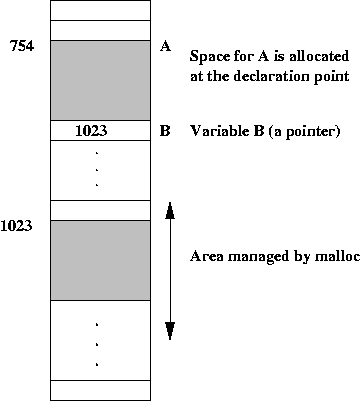
- Array variables are really pointers and can be used as
pointers:
A[3] = 5;
*(A + 4) = 6; // Fifth position in array A.
- You should use regular array indexing (A[3]=5)
where possible, instead of the pointer manipulation (*(A+4) = 5).
- The pointer version explains how arrays work:
- A is the address of the start of the array.
- A+4 is the address 4 positions into the array,
i.e., the address of A[4].
- The expression *(A+4) follows the address.
Thus, the assignment
*(A + 4) = 6;
assigns the value 6 into this location.
Next, let's consider 2D arrays:
(source file)
#include <stdio.h>
int main ()
{
double A[10][10]; // Static allocation of space to array A.
double **B; // We'll use malloc to assign space to B.
int i;
printf ("BEFORE malloc: Address A=%lu Address B=%lu\n", A, B);
// Prints an address for A, but zero for B
// Assign space for first dimension of B (an array of pointers-to-double)
B = (double**) malloc (10 * sizeof(double*));
for (i=0; i<10; i++) {
B[i] = (double*) malloc (10 * sizeof(double));
}
printf ("AFTER malloc: Address A=%lu Address B=%lu\n", A, B);
// Prints an address for A and newly allocated address for B.
// Two ways of assigning values:
A[3][4] = 5.55;
*((double*)A + 5*10 + 6) = 6.66;
printf ("A[3][4]=%lf A[5][6]=%lf\n", A[3][4], A[5][6]); // Prints 5.55 and 6.66.
// Twy ways of assigning values:
B[3][4] = 7.77;
*((*(B + 5)) + 6) = 8.88;
printf ("B[3][4]=%lf B[5][6]=%lf\n", B[3][4], B[5][6]); // Prints 7.77 and 8.88
// Free the individual small arrays:
for (i=0; i<10; i++) {
free (B[i]);
}
// Free the array of double-pointers:
free (B);
}
Note:
- The array A is given a chunk of space for 100 double's.
- The picture of memory after the first call to malloc:
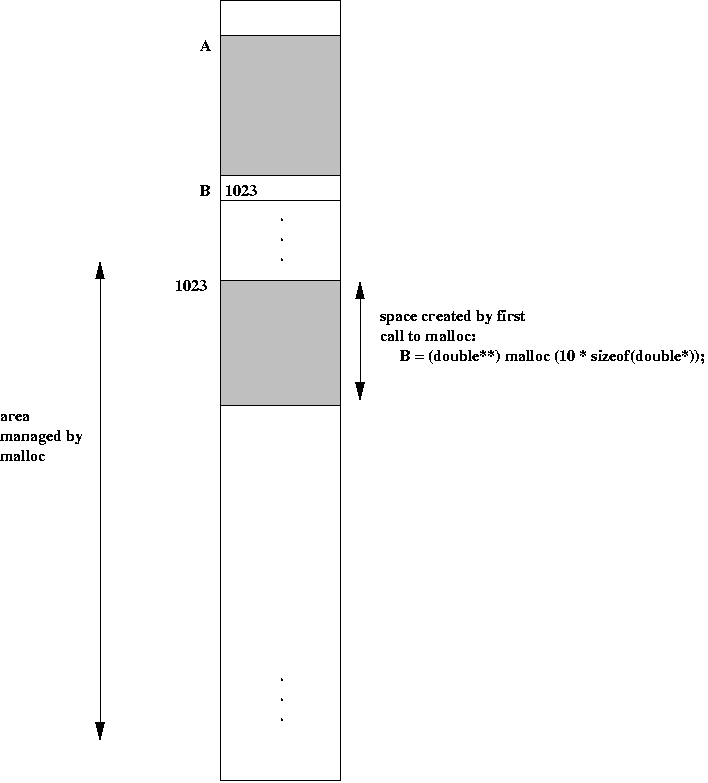
- After the subsequent calls to malloc:
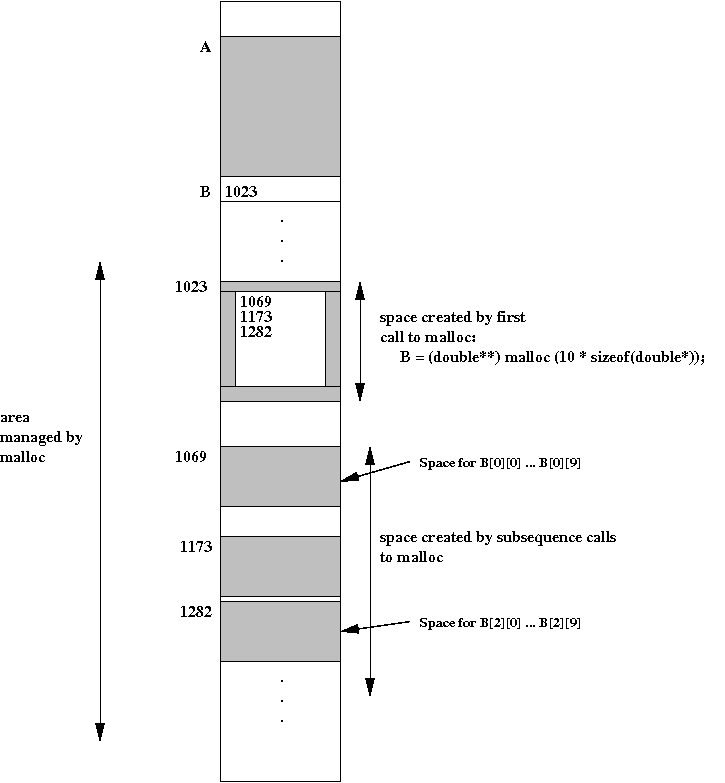
- Both arrays are accessed using standard array indexing:
A[3][4] = 5.55;
B[3][4] = 7.77;
- However, it is also possible (not recommended) to use the
actual addresses and perform address arithmetic:
*((double*)A + 5*10 + 6) = 6.66;
*((*(B + 5)) + 6) = 8.88;
- Let's explain the first one:
*((double*)A + 5*10 + 6) = 6.66;
- A double occupies 8 bytes.
- Thus, a 10 x 10 array requires 100*8 = 800 bytes.
- To get to location A[5][6], we compute
the address of the first byte in the 8 bytes allocated to A[5][6].
- Note that A[5] is the 6-th row and so, we need to
skip past five rows: 5*10.
- Then we skip past 6 positions.
- The total number of positions to skip past: 5*10 + 6.
- Adding this to the start address gives the start address of
position A[5][6].
- Finally, because A is declared as a 2D array,
we need to cast A into a pointer type to perform arithmetic.
- The second one is a little more complicated:
*((*(B + 5)) + 6) = 8.88;
- Recall that B is a pointer that points to a block
of double-pointers.
- Thus, B+5 is the sixth such pointer in the block.
- The expression *(B+5) follows that address, which is
the address of the block of 10 elements assigned to the 6-th row.
- We now add 6 to this address to get the exact address of
element B[5][6].
- Lastly, we follow the address (pointer) with the (outermost)
* operation.
- Note that the individual array blocks need to be
free'd before the double-pointer block pointed to by
B is free'd.
Structures
An example using struct's and pointers:
(source file)
#include <stdio.h>
int main ()
{
// A list node:
struct ListNode {
char *name; // Fields: name and age.
int age;
struct ListNode *next; // The "next" pointer.
};
struct ListNode *front; // Point to front of list.
struct ListNode *rear; // To rear.
struct ListNode *tempPtr; // For temporary use.
// Create a first node:
tempPtr = (struct ListNode *) malloc (sizeof(struct ListNode));
tempPtr->name = "Alice";
tempPtr->age = 19;
tempPtr->next = NULL;
// Add to list:
front = rear = tempPtr;
// Create a second node:
tempPtr = (struct ListNode *) malloc (sizeof(struct ListNode));
tempPtr->name = "Bob";
tempPtr->age = 18;
tempPtr->next = NULL;
// Add to list.
front->next = tempPtr;
rear = tempPtr;
// Print etc ...
}
Note:
- The memory picture after the first node is created:
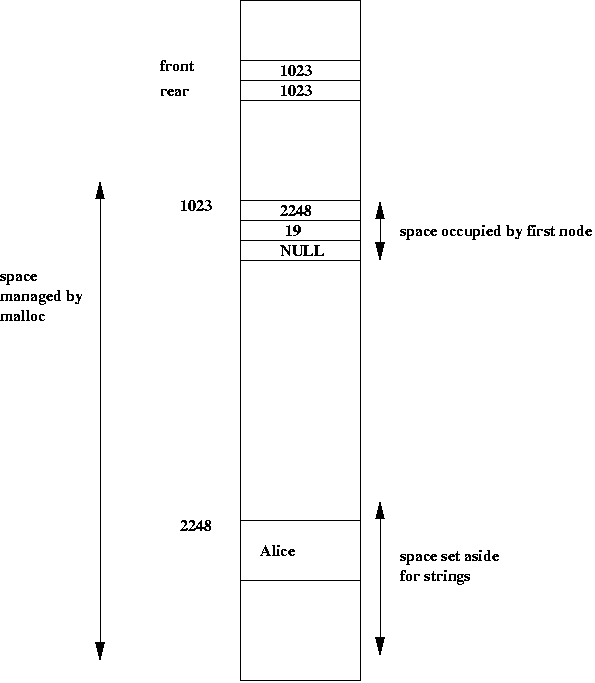
- The memory picture after the second node is created:
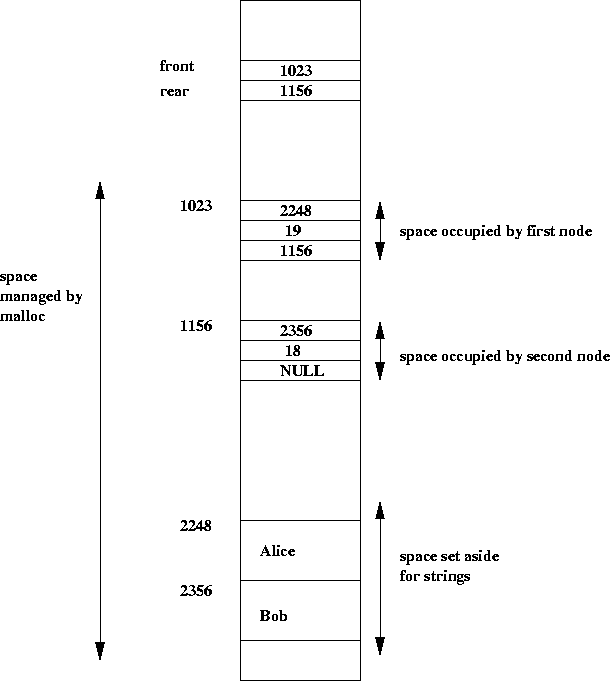
© 2003, Rahul Simha (revised 2017)







